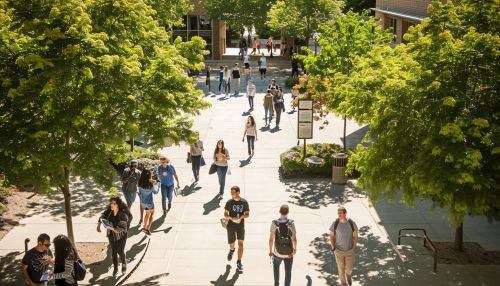Academic Life
Introduction
Academic life refers to the period of learning that occurs at universities, colleges, and other higher education institutions. It encompasses a wide range of activities, including studying, research, teaching, and socializing, all of which contribute to the overall educational experience. Academic life is marked by a commitment to intellectual growth, the pursuit of knowledge, and the development of critical thinking skills.


Studying
Studying is a fundamental aspect of academic life. It involves the acquisition of knowledge and skills through reading, writing, and practical application. Studying can take many forms, from attending lectures and seminars to independent research and group work. It requires discipline, time management, and a commitment to learning.
Study Techniques
Effective study techniques are crucial for success in academic life. These include active reading, note-taking, summarization, and self-testing. The use of mnemonic devices, such as acronyms and visualization, can also aid in information retention. Furthermore, the practice of distributed learning, or spreading study sessions over time, has been shown to improve long-term memory recall.
Research
Research is another significant component of academic life. It involves the systematic investigation of a particular subject or field of study. The purpose of research is to contribute to the existing body of knowledge, solve problems, or develop new theories or methodologies. Research can be conducted in various disciplines, including the sciences, humanities, and social sciences.
Research Methods
There are numerous research methods used in academic life, each with its own strengths and weaknesses. These include quantitative methods, which involve the collection and analysis of numerical data, and qualitative methods, which focus on understanding human behavior and experiences. Other research methods include experimental research, observational studies, surveys, and case studies.
Teaching
Teaching is a key aspect of academic life, particularly for those pursuing careers in academia. It involves the transmission of knowledge and skills to students, often through lectures, seminars, and tutorials. Teaching requires a deep understanding of the subject matter, the ability to communicate effectively, and a commitment to student learning.
Teaching Styles
There are various teaching styles employed in academic life. These include the traditional lecture style, where the teacher is the primary source of information, and the discussion or seminar style, where students are encouraged to participate actively in their learning. Other teaching styles include the flipped classroom, where students review material before class and use class time for discussion and problem-solving, and blended learning, which combines online and face-to-face instruction.
Socializing
Socializing is an important part of academic life, providing opportunities for students to form relationships, develop social skills, and engage in extracurricular activities. This can include joining clubs and societies, participating in sports, and attending social events. Socializing can also contribute to a student's well-being and sense of belonging in the academic community.
Challenges
Academic life can present a number of challenges. These can include academic pressure, time management issues, financial stress, and mental health concerns. It is important for students to seek support when needed, whether from academic advisors, counselors, or peer support networks.
Conclusion
Academic life is a multifaceted experience, encompassing studying, research, teaching, and socializing. It offers opportunities for intellectual growth, the pursuit of knowledge, and the development of critical thinking skills. However, it can also present challenges, requiring resilience, adaptability, and a commitment to learning.
